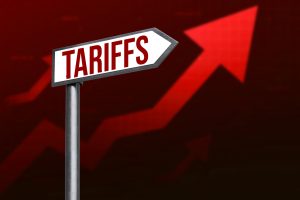 Since President Trump took office on January 20, 2025, the administration has implemented significant changes to U.S. trade policy, including most notably with respect to tariffs. Within weeks of taking office, the White House announced changes to tariffs on steel and aluminum which placed a tariff of 25% on all such imports. New tariffs were also separately imposed on imports from Canada, Mexico and China subject to certain exceptions. Then, on April 2, President Trump announced “reciprocal” tariffs on most imports from most countries, branding the day as “Liberation Day” and one of “American industry rebirth.” These tariffs, which include a 10% baseline rate and higher specific tariffs targeting China, Vietnam and the EU, among others, prompted heightened concerns about a trade war. Then, on April 9, President Trump announced that although the 10% baseline reciprocal tariff will remain effect, the higher reciprocal tariffs will be postponed for 90 days—except for China, for which the reciprocal tariff and duties are being increased to 105%, which are being applied in addition to prior 20% duties and the Section 301 duties.
Since President Trump took office on January 20, 2025, the administration has implemented significant changes to U.S. trade policy, including most notably with respect to tariffs. Within weeks of taking office, the White House announced changes to tariffs on steel and aluminum which placed a tariff of 25% on all such imports. New tariffs were also separately imposed on imports from Canada, Mexico and China subject to certain exceptions. Then, on April 2, President Trump announced “reciprocal” tariffs on most imports from most countries, branding the day as “Liberation Day” and one of “American industry rebirth.” These tariffs, which include a 10% baseline rate and higher specific tariffs targeting China, Vietnam and the EU, among others, prompted heightened concerns about a trade war. Then, on April 9, President Trump announced that although the 10% baseline reciprocal tariff will remain effect, the higher reciprocal tariffs will be postponed for 90 days—except for China, for which the reciprocal tariff and duties are being increased to 105%, which are being applied in addition to prior 20% duties and the Section 301 duties.
Articles Posted in Political Risk
Forced to Flee: Insuring Against Political Risks
 IKEA’s Billy bookcase—so popular that one is reportedly sold every 10 seconds—recently got even cheaper, at least for Russians. IKEA is holding a fire sale as the company closes its stores and exits the Russian market. The Swedish furnituremaker’s exit from Russia is just the latest in a string of actions by over 1,000 companies—including Disney, Goldman Sachs, IBM, McDonalds and Starbucks—that are curtailing operations in the country in response to the Russia/Ukraine conflict. As of June 2022, global companies fleeing Russia have reportedly racked up more the $59 billion in losses associated with their departure. Of course, this pales in comparison to the more than 10,000 civilian casualties and $600 billion in economic losses that Ukraine has suffered since the conflict began. But even though the corporate exodus from Russia for many companies is voluntary (and has even been used by some as a positive public-relations spin), Russia has threated to confiscate Russian-based assets of companies from countries that Russia considers hostile to its interests, and U.S. and EU sanctions may practically serve to prohibit some companies from operating in Russia, all of which highlights that additional risks lie ahead.
IKEA’s Billy bookcase—so popular that one is reportedly sold every 10 seconds—recently got even cheaper, at least for Russians. IKEA is holding a fire sale as the company closes its stores and exits the Russian market. The Swedish furnituremaker’s exit from Russia is just the latest in a string of actions by over 1,000 companies—including Disney, Goldman Sachs, IBM, McDonalds and Starbucks—that are curtailing operations in the country in response to the Russia/Ukraine conflict. As of June 2022, global companies fleeing Russia have reportedly racked up more the $59 billion in losses associated with their departure. Of course, this pales in comparison to the more than 10,000 civilian casualties and $600 billion in economic losses that Ukraine has suffered since the conflict began. But even though the corporate exodus from Russia for many companies is voluntary (and has even been used by some as a positive public-relations spin), Russia has threated to confiscate Russian-based assets of companies from countries that Russia considers hostile to its interests, and U.S. and EU sanctions may practically serve to prohibit some companies from operating in Russia, all of which highlights that additional risks lie ahead.
Insuring Political Risk in the United States
 On March 13, 2020, three plainclothes police officers forced entry into an apartment and fired some 32 shots. A woman sleeping in her bed was shot six times and died.
On March 13, 2020, three plainclothes police officers forced entry into an apartment and fired some 32 shots. A woman sleeping in her bed was shot six times and died.
On May 25, 2020, a Black man was killed during a routine arrest when a police officer knelt on his neck for 9 minutes and 29 seconds.
On September 3, 2020, a woman drove her car into a crowd of Black Lives Matter protesters, injuring several people.
On December 12, 2020, four people were stabbed in the Nation’s capital following a day of protesting by competing groups over the results of a democratic election.
On January 6, 2021, thousands of insurrectionists pushed past a police blockade to breach the U.S. Capitol building while lawmakers were certifying the votes of a democratic election.
On March 29, 2021, an elderly Asian woman was physically and verbally attacked on her way to church.
On April 2, 2021, a man rammed his car into the security barrier near the U.S. Capitol building, killing one officer and injuring another.
Unfortunately, as we all know, these brief summaries are merely a snapshot of the political and racial unrest that has been unfolding in the United States over the last year. During these trying times, various companies, from Nike to Estée Lauder, have begun speaking out in support of Black lives, police reform and the Asian community. Many companies also wrote to Congress in support of free and fair democratic elections and urged Congress to certify the electoral vote following the United States’ 2020 presidential election. This type of corporate soul searching is commendable. And, for many companies, showing public support for racial justice and equality and/or other democratic principles is fundamental to their culture and positioning as leaders in their marketplace.
 Policyholder Pulse
Policyholder Pulse


